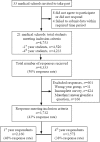Do medical students studying in the United Kingdom have an adequate factual knowledge of basic life support?
- PMID: 30687442
- PMCID: PMC6340821
- DOI: 10.5847/wjem.j.1920-8642.2019.02.002
Do medical students studying in the United Kingdom have an adequate factual knowledge of basic life support?
Abstract
Background: Healthcare professionals have a duty to maintain basic life support (BLS) skills. This study aims to evaluate medical students' factual knowledge of BLS and the training they receive.
Methods: A cross-sectional, closed-response questionnaire was distributed to the first- and fourth-year students studying at institutions in the United Kingdom. The paper questionnaire sought to quantify respondent's previous BLS training, factual knowledge of the BLS algorithm using five multiple choice questions (MCQs), and valuate their desire for further BLS training. Students received 1 point for each correctly identified answer to the 5 MCQ's.
Results: A total of 3,732 complete responses were received from 21 medical schools. Eighty percent (n=2,999) of students completed a BLS course as part of their undergraduate medical studies. There was a significant difference (P<0.001) in the percentage of the fourth-year students selecting the correct answer in all the MCQ's compared to the first-year students except in identifying the correct depth of compressions required during CPR (P=0.095). Overall 10.3% (95% CI 9.9% to 10.7%) of respondents correctly identified the answer to 5 MCQ's on BLS 9% of the first-year students (n=194) and 12% of the fourth-year students (n=190). On an institutional level the proportion of students answering all MCQ's correctly ranged from 2% to 54% at different universities. Eighty-one percent of students (n=3,031) wished for more BLS training in their curriculum.
Conclusion: Factual knowledge of BLS is poor among medical students in the UK. There is a disparity in standards of knowledge across institutions and respondents indicating that they would like more training.
Keywords: Basic life support; Emergency Medicine; Medical education; Resuscitation.
Conflict of interest statement
Conflicts of Interest: We have read and understood the journal’s and ICJME policy on declaration of interests and declare that we have no competing interests.
Figures
Comment in
-
Urgent review of UK medical student CPR training recommended.Med Teach. 2022 Aug;44(8):943. doi: 10.1080/0142159X.2021.1984410. Epub 2021 Oct 5. Med Teach. 2022. PMID: 34608824 No abstract available.
References
-
- WHO. Fact Sheet:310 - The 10 leading causes of death in the world. 2014
-
- Yasunaga H, Horiguchi H, Tanabe S, Akahane M, Ogawa T, Koike S, et al. Collaborative effects of bystander-initiated cardiopulmonary resuscitation and prehospital advanced cardiac life support by physicians on survival of out-of-hospital cardiac arrest:a nationwide population-based observational study. Crit Care. 2010;14(6):R199. - PMC - PubMed
-
- (UK) RC. Quality standards for cardiopulmonary resuscitation. Secondary Quality standards for cardiopulmonary resuscitation November. 2013. https://www.resus.org.uk/quality-standards/
LinkOut - more resources
Full Text Sources


